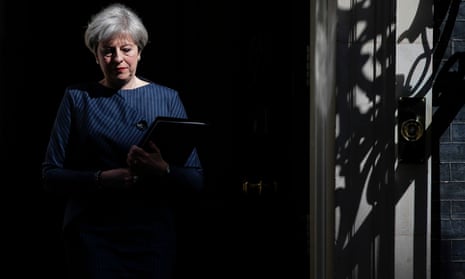In your report (May: give me my mandate, 19 April) you claim that the election announced for 8 June would be a third nationwide poll in three years. It will actually be the fourth, as there were nationwide elections for the European parliament in 2014, in addition to the general election of 2015 and the 2016 referendum.
One of the reasons we are now facing the potential threat of a damaging, costly Brexit is that European elections have not always been regarded with the same level of importance as general elections. As the false claims of the leave campaign continue to unravel, and Theresa May cuts and runs before the inevitable harm to our economy becomes too obvious, perhaps we should reflect that the European parliament, and the work of British MEPs, really does matter.
Richard Corbett
Labour MEP for Yorkshire & Humber
Your otherwise comprehensive outline of reasons why a general election is not necessary (Editorial, 19 April) was silent on one key matter. About 20 Tory MPs are presently subject to investigations into the expenses they incurred in the 2015 election campaign, with the Crown Prosecution Service considering files prepared by a large number of police forces to decide whether the case has been made for the courts to try these matters. Holding an election could be seen as thwarting justice and interfering with the integrity of our electoral system.
Les Bright
Exeter, Devon
In announcing her snap election Mrs May has broken her promise to restore the vote to ex-pats who have lived abroad for more than 15 years. In the Queen’s speech for his government David Cameron assured us it would be high on his list of priorities, but wasn’t in office long enough to implement it. And Mrs May assured us it would certainly happen in her remit, but the speed in which she has called an election rules it out for another five years.
There are a lot of us carrying British passports who live abroad and care deeply about what happens to our country, yet we have no voice, no representatives, and are completely disenfranchised.
Jill Watts-Jones
St Genest d’Ambière, France
All the evidence from both the 2010 and 2015 televised election debates points to their civic value in reaching people who are least likely to access any other form of election information, in helping voters to understand the differences between the key policies of the parties, and in encouraging viewers to speak to one another about the election. Refusal by any single party to participate in TV debates in 2017 (May says no to facing Corbyn, 19 April) should not be allowed to prevent them from happening. Broadcasters should run the debates without them and allow voters to draw their own conclusions.
Stephen Coleman
Professor of political communication, University of Leeds
Not only are 16- and 17-year-olds denied a vote in our electoral system, but the government is preventing young people from getting involved in the election by calling it in the middle of the exam season. And what will A-level politics students be doing on 8 June? Government and politics AS unit 2.
Simon Keable-Elliott
Head of politics, Royal Russell School, Croydon
The last unfulfilled demand of the 1838 People’s Charter was for annually elected parliaments. Almost 180 years later I’m pleased to see that Theresa May, in calling an election two years after the last one, is at last making some progress on it.
Keith Flett
London
Join the debate – email guardian.letters@theguardian.com
